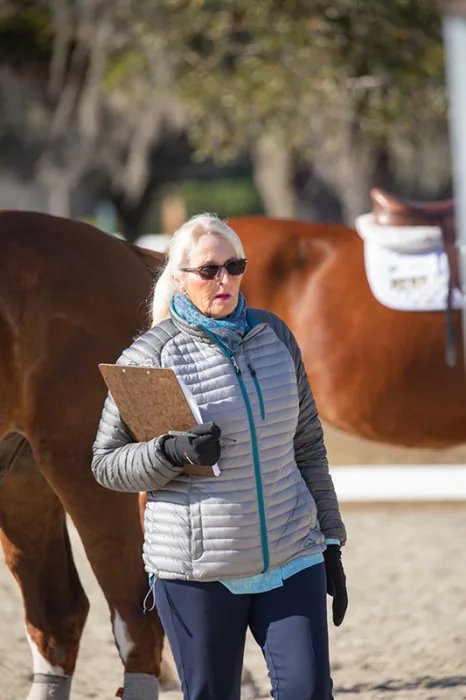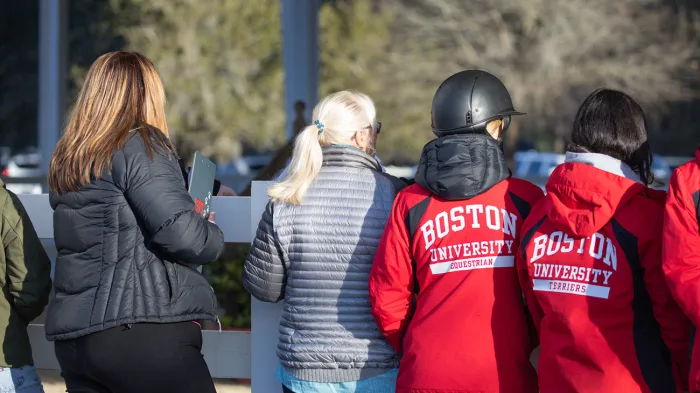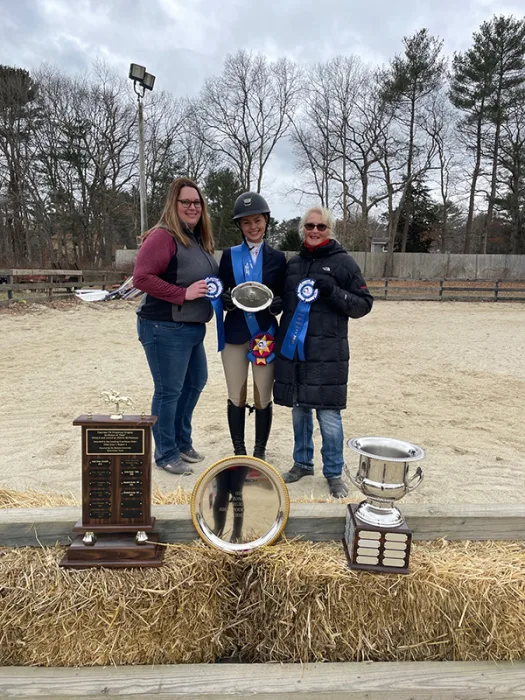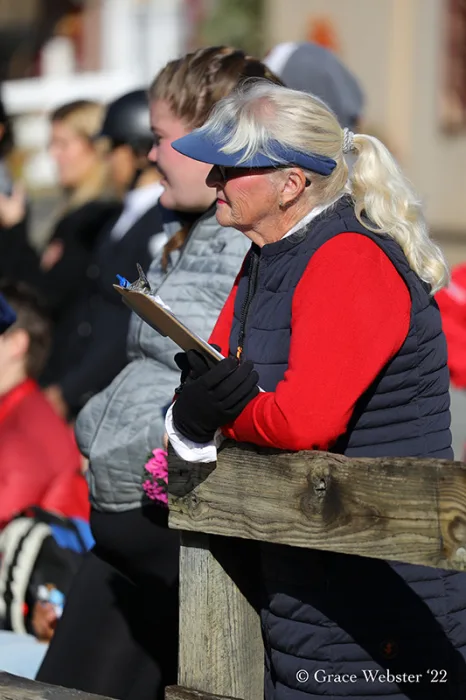In the more than three decades since Phyllis Cervelli stepped into her role as head coach of Boston University’s equestrian team, she’s given a lot of advice. Each year, her athlete roster ranges from walk-trot beginners to horse show veterans—all of whom must be prepared to ride an unfamiliar horse in Intercollegiate Horse Shows Association competitions.
Whatever the athlete’s skill level, Cervelli distills her guidance down to one simple edict: Make friends with your horse.
“Most of my lessons include strategy riding in the ring—getting on your horse and making friends with it—because you’re not there to train it; you’re just there to ride it,” Cervelli said. “After 30 years, that one seems to work the best.”
Cervelli got hooked on horses early. She grew up near Boston, in a house full of horse-obsessed sisters with ponies in their yard. Her oldest sister taught the younger girls lessons, and they dabbled in endurance riding, eventing and dressage.

As Cervelli grew more serious about dressage, she trained under equestrian icons like Michael Plumb and Dottie Morkis. Her passion turned professional in the 1980s when Cervelli moved to Wellington, Florida, to ride for Margie Engle, whom she credits with encouraging her to refocus her efforts from flatwork back into jumping.
Cervelli eventually returned to Massachusetts to run Holly Hill Show Stable alongside her sisters Patty Harnois, Nancy Venezia and Cathy Grady. In the decades since, the farm has become a homebase for her boutique barn of hunter/jumper clients and a rotating cast of young adults from the BU equestrian team.
Eileen Blair, BU’s assistant coach since 2010, says Cervelli’s extensive equestrian background is the backbone of her teaching, but it’s her personality that makes her coaching so effective.
“There’s something special about having her at the in-gate and just knowing that you have somebody who believes in you no matter what, who’s rooting for you as a person,” Blair said.
Riding As A Team Sport
Each fall, vanloads of students pile out at Holly Hill in Hanover, Massachusetts, to try out for the BU Equestrian Team. Some are lifelong riders, while others have never set foot in a stirrup.
“They’ll recruit their roommates because we always need walk-trot riders. They dress them up, and they look like they’re going to a Medal/Maclay class when they show up for tryouts,” Cervelli said with a chuckle.

During tryouts, Cervelli and Blair said they are looking for great attitudes and a willingness to invest their time. Cervelli believes even the students who come to BU with a riding background have something new to learn because intercollegiate sports are so unlike conventional riding programs. Experienced riders who grew up in show barns have to acclimate to riding as a team sport.
“The team aspect is so special at the IHSA,” Blair said. “For so long, you have barnmates, but sometimes you might be competing against each other. Then, when you get into this kind of competition series, you’re rooting for everybody; you need all those different levels. You’re just as invested in making sure that your walk-trot rider knows their diagonal as you are with your open rider going in for a flat class, even though this is probably their 500th flat class they’ve ever done in their life.”
Cervelli noted that her teams bond quickly and naturally without much interference from their coach while commuting to lessons, traveling to shows, and even volunteering together in the city.
ADVERTISEMENT
“They do a lot of extracurricular activities in Boston together,” Cervelli said. “They have boot polishing parties and pizza parties, and they fundraise together.”
Recent BU graduate Elizabeth Nevins was the equestrian team’s captain for two years and ended her IHSA career on the highest high note: winning the 2023 Cacchione Cup at the IHSA National Championships (Kentucky). But she says some of her favorite moments as a college athlete were the most mundane: chatty van rides to lessons, road tripping in a snowstorm to make it home from a show in time for exams, and rooting for an intro rider who had never seen a horse before joining the team.
Nevins was a serious competitor in equitation and junior jumper divisions at home in Washington state. After burning out in the show ring at the end of high school, she enrolled at BU with a plan to take a break from horses during college. However, she said her horse bug nagged at her until she tried out, and she’s grateful she acquiesced.

“BU’s team is like nothing I’ve ever been a part of in my life,” Nevins said. “I’d quit those other team sports early on in my childhood, so I had never contributed to something that mattered more than just my individual efforts that day.”
Lessons at BU, where students like Nevins ride alongside riders learning to post the trot, help foster that sense of camaraderie. Cervelli organizes her coaching schedule based on students’ courses and availability, not ability. That structure leads to supportive friendships between teammates.
“You have to give everybody as much as you can, even though there are different levels,” Cervelli said. “But I find that [when] novice and walk-trot riders watch the open riders perform, they can go out and try to emulate the same performance, and then they have a very good idea of what they’re looking to be like.”
During lessons, students work with a variety of horses to develop their feel for different types of rides, and Cervelli admits to intentionally mismatching horses and riders so students can learn to get along with their mount. Somehow Cervelli makes it all work in a single arena, despite the diversity of rider and mount.
“My Halloween costume is always a ringmaster,” Cervelli said, laughing.
Blair believes the key to juggling the mixed goals of these athletes is Cervelli’s emphasis on riding fundamentals.
“She breaks it down and makes sure it’s very clear and very easy to understand that you’re riding a living, breathing creature, and you need to be aware of what he’s willing to provide,” Blair said. “This isn’t a carousel horse that’s going to go around perfect for you every two seconds. So for her, it’s trying to explain the ‘why,’ as well as the techniques.”
‘A Good Rider Is A Thinking Rider’
While the faces of the college equestrian team change on a regular basis, Cervelli says there’s a commonality between each new crop of BU riders.
“The different schools draw different personalities,” she said. “I’ve always found that, from my captains and my team, they’re worldly people.”

Cervelli compares her experience with her “worldly” BU students—she’s had riders from France, Brazil and India—to those she’s known during a few short stints coaching at other schools. Coaching elsewhere, she says she had to “babysit” the riders, often traveling on the bus to and from competitions. By contrast, she finds the average BU student is an especially independent young adult.
ADVERTISEMENT
“These guys just call me and ask me what I want in my coffee and say, ‘I’ll see you there,’ ” Cervelli said, describing her students on show days.
“Riding just promotes such confidence in people—individuality,” she said. “Every sport has its plus. I just know you can’t be good at this and not have some sort of independence and confidence.”
Cervelli prides herself on helping develop her athletes’ mental game as well as their riding skills. Nevins had more show miles than most of her teammates, but when she started at BU, Cervelli noticed the normally confident, capable rider could succumb to performance jitters. They worked on Nevins’ mindset to overcome her show-day anxiety.
“[Nevins] really just built up over the four years for her to become so confident and trusting of the decisions that we both made together,” Cervelli said. “You don’t know your horse until you have the horse draw. She’s very much a bookkeeper, so she could tell you when the horse wagged its tail last. She really watched them quite a bit.”
At the 2023 Cacchione Cup, Nevins’ winning round exhibited the kind of riding that Cervelli likes to see in all her students. Nevins drew Houdini, from Centenary University (New Jersey), and she used the information she’d gained from watching him throughout the championships and in previous competitions to quickly make friends with the gelding.
“To me, a good rider is a thinking rider,” Cervelli said. “If they can think about how they want to make it happen, instead of panicking, a lot of the time it just works for them.”
Nevins says that while she cherishes that big win, another quieter moment from that competition stands out. The night before her final round, Nevins and Cervelli went to dinner, just the two of them. Anxious about her performance the next day, Nevins only ordered a salad. But Cervelli noticed her eyeing the heaping plates at neighboring tables.
“I had gotten up to go get my salad at the salad bar, and when I came back there were these loaded potato skins in front of my seat at the table,” Nevins said. “She was like, ‘Eat up, girl.’ ”
It may have been just a plate of potatoes, but Nevins recalls that gesture as a moment of support and friendship between rider and coach.
Cervelli’s special ability to make friends of both people and horses is grounded in respect. She respects her riders’ individual needs and abilities. And when it comes to the horses, she’s grateful for what they give.
“I think over the years of being around Phyllis, she has such a love for these animals and such a respect for what they provide,” Blair said. “Especially in the IHSA, where a lot of them are being signed up to have seven or eight different people on that day with consistently different results each time. It’s about just being grateful that they’re there, and they’re participating, and that you are lucky enough to be able to ride these horses and be able to compete.”
This article originally appeared in the Dec. 18-25, 2023, issue of The Chronicle of the Horse. You can subscribe and get online access to a digital version and then enjoy a year of The Chronicle of the Horse and our lifestyle publication, Untacked. If you’re just following COTH online, you’re missing so much great unique content. Each print issue of the Chronicle is full of in-depth competition news, fascinating features, probing looks at issues within the sports of hunter/jumper, eventing and dressage, and stunning photography.














